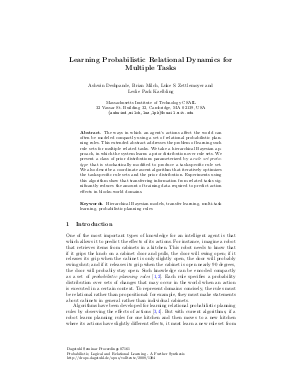Learning Probabilistic Relational Dynamics for Multiple Tasks
Authors Ashwin Deshpande, Brian Milch, Luke S. Zettlemoyer, Leslie Pack Kaelbling
-
Part of:
Volume:
Dagstuhl Seminar Proceedings, Volume 7161
Part of: Series: Dagstuhl Seminar Proceedings (DagSemProc) - License:
 Creative Commons Attribution 4.0 International license
Creative Commons Attribution 4.0 International license
- Publication Date: 2008-03-06
File

PDF
DagSemProc.07161.4.pdf
- Filesize: 211 kB
- 10 pages
Document Identifiers
Subject Classification
Keywords
- Hierarchical Bayesian models
- transfer learning
- multi-task learning
- probabilistic planning rules
Metrics
- Access Statistics
-
Total Accesses (updated on a weekly basis)
0Document
0Metadata
Abstract
The ways in which an agent's actions affect the world can often be modeled compactly using a set of relational probabilistic planning rules. This extended abstract addresses the problem of learning such rule sets for multiple related tasks. We take a hierarchical Bayesian approach, in which the system learns a prior distribution over rule sets. We present a class of prior distributions parameterized by a rule set prototype that is stochastically modified to produce a task-specific rule set. We also describe a coordinate ascent algorithm that iteratively optimizes the task-specific rule sets and the prior distribution. Experiments using this algorithm show that transferring information from related tasks significantly reduces the amount of training data required to predict action effects in blocks-world domains.
Cite As Get BibTex
Ashwin Deshpande, Brian Milch, Luke S. Zettlemoyer, and Leslie Pack Kaelbling. Learning Probabilistic Relational Dynamics for Multiple Tasks. In Probabilistic, Logical and Relational Learning - A Further Synthesis. Dagstuhl Seminar Proceedings, Volume 7161, pp. 1-10, Schloss Dagstuhl – Leibniz-Zentrum für Informatik (2008)
https://doi.org/10.4230/DagSemProc.07161.4
BibTex
@InProceedings{deshpande_et_al:DagSemProc.07161.4,
author = {Deshpande, Ashwin and Milch, Brian and Zettlemoyer, Luke S. and Kaelbling, Leslie Pack},
title = {{Learning Probabilistic Relational Dynamics for Multiple Tasks}},
booktitle = {Probabilistic, Logical and Relational Learning - A Further Synthesis},
pages = {1--10},
series = {Dagstuhl Seminar Proceedings (DagSemProc)},
ISSN = {1862-4405},
year = {2008},
volume = {7161},
editor = {Luc de Raedt and Thomas Dietterich and Lise Getoor and Kristian Kersting and Stephen H. Muggleton},
publisher = {Schloss Dagstuhl -- Leibniz-Zentrum f{\"u}r Informatik},
address = {Dagstuhl, Germany},
URL = {https://drops.dagstuhl.de/entities/document/10.4230/DagSemProc.07161.4},
URN = {urn:nbn:de:0030-drops-13846},
doi = {10.4230/DagSemProc.07161.4},
annote = {Keywords: Hierarchical Bayesian models, transfer learning, multi-task learning, probabilistic planning rules}
}
